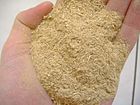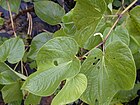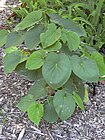Note: This is a project under development. The articles on this wiki are just being initiated and broadly incomplete. You can Help creating new pages.
Piper methysticum - Kava
Kava is a crop of the western Pacific. Kava is consumed throughout the Pacific Ocean cultures of Polynesia, including Hawaii, Vanuatu, Melanesia and some parts of Micronesia for its sedating effects.
Contents
- 1 Uses
- 2 Parts Used
- 3 Chemical Composition
- 4 Common names
- 5 Properties
- 6 Habit
- 7 Identification
- 8 List of Ayurvedic medicine in which the herb is used
- 9 Where to get the saplings
- 10 Mode of Propagation
- 11 How to plant/cultivate
- 12 Commonly seen growing in areas
- 13 Photo Gallery
- 14 References
- 15 External Links
Uses
Nausea, Loss of appetite, Tiredness, Liver disorders, Abdominal pain, Dark urine, Anxiety ,Stress, Sore throats
Parts Used
Chemical Composition
Trimethyl-1-naphthol, 5-methyl-1-phenylhexen-3-yn-5-ol, octadecadienoic acid-methyl ester, Dimethylflavanone, Pinostrobin chalcone and 7-dimethoxyflavanone-5 hydroxy[1]
Common names
| Language | Common name |
|---|---|
| Kannada | |
| Hindi | |
| Malayalam | |
| Tamil | |
| Telugu | |
| Marathi | NA |
| Gujarathi | NA |
| Punjabi | NA |
| Kashmiri | NA |
| Sanskrit | |
| English | Ava, Ava Pepper |
Properties
Reference: Dravya - Substance, Rasa - Taste, Guna - Qualities, Veerya - Potency, Vipaka - Post-digesion effect, Karma - Pharmacological activity, Prabhava - Therepeutics.
Dravya
Rasa
Tikta (Bitter), Kashaya (Astringent)
Guna
Laghu (Light), Ruksha (Dry), Tikshna (Sharp)
Veerya
Ushna (Hot)
Vipaka
Katu (Pungent)
Karma
Kapha, Vata
Prabhava
Habit
Identification
Leaf
| Kind | Shape | Feature |
|---|---|---|
| Simple | alternate | The leaves are heart-shaped, 10-30 cm x 8-23 cm; stipules large, persistent |
Flower
| Type | Size | Color and composition | Stamen | More information |
|---|---|---|---|---|
| Unisexual | 3-9 cm long | Yellow | 2 | The female spike bears flowers with a single basal ovule in an unilocular ovary topped by a stigma. |
Fruit
| Type | Size | Mass | Appearance | Seeds | More information |
|---|---|---|---|---|---|
| General | 7–10 mm | Fruit seldom produced; a berry containing one seed | single | {{{6}}} |
Other features
List of Ayurvedic medicine in which the herb is used
Where to get the saplings
Mode of Propagation
How to plant/cultivate
The kava plant is propagated from cuttings taken from the lower stems or from the younger stems once separated from the rootstock when the root is harvested.[3]
Commonly seen growing in areas
Damp areas, near streams, Borders of forests and fields.
Photo Gallery
References
External Links
- Ayurvedic Herbs known to be helpful to treat Nausea
- Ayurvedic Herbs known to be helpful to treat Loss of appetite
- Ayurvedic Herbs known to be helpful to treat Tiredness
- Ayurvedic Herbs known to be helpful to treat Liver disorders
- Ayurvedic Herbs known to be helpful to treat Abdominal pain
- Ayurvedic Herbs known to be helpful to treat Dark urine
- Ayurvedic Herbs known to be helpful to treat Anxiety
- Ayurvedic Herbs known to be helpful to treat Stress
- Ayurvedic Herbs known to be helpful to treat Sore throats
- Herbs with Roots used in medicine
- Herbs with Rhizome used in medicine
- Herbs with common name in English
- Habit - Shrub
- Index of Plants which can be propagated by Seeds
- Index of Plants which can be propagated by Cuttings
- Herbs that are commonly seen in the region of Damp areas
- Herbs that are commonly seen in the region of near streams
- Herbs that are commonly seen in the region of Borders of forests and fields
- Herbs
- Piperaceae









